It’s hard to overstate the value dogs have played in the lives of humans. We probably wouldn’t even be here if it weren’t for dogs, as our partnership probably allowed us to out-compete Neanderthals.
Dogs continue to provide immeasurable value to our lives in the modern world. For most of us, this value comes in the form of companionship and unconditional love (as well as a bit of entertainment). But some people derive even more value from dogs. Some depend on dogs to navigate the challenges of daily life.
This includes not only service dogs, who help blind or deaf owners overcome their challenges, but emotional support animals, who help to soothe frayed nerves and short-circuit panic attacks.
Some dogs have even been trained to perform potentially life-saving tasks, such as monitoring their owner’s blood sugar levels.
But today, we’re going to focus on the ways dogs can help those with autism spectrum disorders.
As it turns out, dogs can make incredible companions for autistic children, and some can even provide specific services that help improve the lives of these kids.
Below, we’ll talk about the ways dogs help autistic kids, compare and contrast the different roles four-footers can play in an autistic child’s life, and discuss some of the best breeds to consider.
Animals and Autistic Children
Before we get started, let me ask you to indulge me for a moment, so I can share a personal experience relevant to the subject at hand (if you’re in a hurry, feel free to skip down to the next section).
Before I started writing full time, I made my living as an environmental educator (among other things, I ran a 501c3 nature preserve).
The work required me to do a bunch of different things, from guiding families on nature hikes, to monitoring the habitat, to my favorite thing – conducting live animal presentations. I’d bring out a couple of animals, rattle off some of the basic information about the species, answer questions, and, usually, let willing audience members touch the animals.
The vast majority of the audiences for these programs were elementary school groups, scout groups, mom’s clubs, and seniors, but I also had the privilege of putting on these programs for a variety of special needs kids – including many who were on the autism spectrum.
One school, which specifically catered to the needs of autistic children, even built weekly visits to the preserve into the school’s curriculum. These kids would get to come to the preserve each week and meet a new set of animals.
Their weekly visits were easily the highlight of my week, and I’d like to think the kids enjoyed them too.
The animals involved were typically non-domesticated or exotic species, including millipedes, alligators, ducks, snakes, chinchillas, and many more unique critters. Some were bigger hits with the kids than others (a giant tortoise was a particular favorite), but I don’t think I ever introduced them to an animal that didn’t strike a chord with some portion of the kids.
One day (and we’re finally getting to my point — I appreciate your patience), I brought my dog with me to work. She was a sugary sweet chocolate lab who eagerly made friends with everyone she met. So, at the end of the program, I asked the kids if they’d like to meet her. You can probably guess their response.
I took all of the kids outside and had them wait in a semi-circle, just as they would when I would introduce them to any other animal. Once they were ready, I made the clicky sound my dog knew well, and she came trotting outside while smiling and wagging her tail.
To say that the kids were excited about the experience would be the understatement of the century.
They lost their minds with joy.
The kids were petting her and throwing her tennis ball this way and that. I even taught the kids some of my dog’s commands and tricks, so they began telling her to sit, roll over, and bark. Their teachers practically had to drag them back onto the bus when the class was over.
I had come to expect that the kids would love the animals I introduced them to, but I was thoroughly unprepared to see just how much they loved meeting a dog. I’d introduced these kids to incredible and bizarre animals from all over the globe, but nothing ever impacted them the way my silly Lab did.
In the years that followed, I had the chance to introduce my pup to many other autistic children. And while there were certainly exceptions, most of the kids thoroughly enjoyed getting the chance to meet a canine.
So, add my voice to the countless others who sing about the benefits dogs can provide to autistic children.
Different Dogs for Different Roles: How Dogs Can Serve Special Needs Kids
There are three basic ways a dog can play an important role in your child’s life. The first thing you must do is decide what this role will be.
Dogs can serve autistic children as:
Service Dogs
Service dogs are trained to perform specific tasks that benefit or assist their owner. The classic example is a seeing eye dog, but service dogs can also be very helpful for children with autism spectrum disorders.
Some of the tasks service dogs often perform for autistic kids include:
- Tracking and locating autistic children who tend to wander off.
- Intervening in cases of self-harm, by putting themselves in between your child and the source of harm.
- Being tethered to autistic children to act as a chaperone and keeping the child out of danger.
- Sitting on your child’s feet during meltdowns to help “ground” your child and ease anxiety.
Obviously, dogs that perform these services require very comprehensive training, and they can, unfortunately, be pretty expensive (most start at around $10,000). But, a legitimate service dog should also be afforded near-universal access to public and private locations and allowed to stick by your child’s side in school or anywhere else he or she needs to go.
Emotional Support Dogs
Emotional support dogs enjoy many of the same protections and privileges that service dogs do, but instead of being trained to perform specific services or duties, they’re primarily tasked with providing love and comfort.
In the case of autistic children, such dogs can be very valuable for calming those who struggle with frustration and anxiety.
Despite not being trained to perform a specific task, emotional support dogs must still be well-trained. They’ll need to be not only obedient, but well-behaved too. This will ensure that they don’t cause problems in public or while your child is in school. Plus, teaching your emotional support dog a few specialized commands isn’t a bad idea either, as this may even lead to your pup qualifying to be a service dog at some point in the future.
Because they don’t require as much training as service dogs, emotional support dogs are usually less expensive. They vary pretty widely in cost, and there are also a few non-profits that may be able to help you acquire an emotional therapy dog for a reduced fee. That being said, it’s usually not too difficult to train an emotional support dog yourself, since they don’t need to have any specialized training.
Pets
In addition to service dogs and emotional support dogs, plain ol’ pet dogs can be amazingly valuable for autistic children.
Pet dogs won’t perform any specific services to your child, and they won’t be allowed to accompany your child to school or in every public place. But that doesn’t mean they don’t provide meaningful value to autistic children, because they do.
Many autistic children will enjoy a pet for the same reasons and in the same manner that most youngsters do, but they may also enjoy a few additional benefits. In fact, there is even research that backs this notion.
For example, one study showed that children with autism spectrum disorder not only bonded strongly with their pets (which provides value in itself), but they enjoyed improved social skills too. Many also became more assertive after helping to care for their pet.
Other studies (including one which focus on guinea pigs rather than dogs, but the findings are likely applicable to dogs too) have found that pets help to reduce the stress and problematic behaviors that many autistic children struggle with.
Picking Out a Specific Dog For An Autistic Child
Now that you understand how valuable a dog can be for autistic children, as well as the different roles your canine can take on in your child’s life, it is time to start picking out a specific breed for your kid.
If you think that an emotional support dog or a service dog is the best choice for your child, you’ll need to contact an agency that trains and prepares dogs for such work.
In these cases, you don’t want to focus on the breed as much as you want to work with professionals to determine the best individual dog for your kid (although it is wise to familiarize yourself with the basics of the breed in question and select one that’ll fit in well with your family).
On the other hand, if you are just looking for a pet, you should pay very special attention to the breed you select.
Different breeds exhibit varying personalities, aptitudes, and care requirements, and you’ll be wise to pick one that is a good match for your family.
We are going to concentrate on helping those looking for a pet. With this in mind, we’ll explain the types of traits to seek out and the best breeds to consider below.
Important Traits for Dogs Who Will Be Paired With Autistic Children
Dogs can clearly be valuable companions for autistic children, but some dogs are better suited for these relationships than others.
There are no cut-and-dry rules in this regard, and exceptions certainly exist. However, the majority of dogs that will make good companions for autistic children exhibit the following traits:
Gentle Disposition
Above all else, you need to be sure that you select a gentle dog, who will treat your child with kid gloves and stoically suffer the indignities any child can inflict upon his or her pet.
This doesn’t mean you can’t select a playful and fun-loving breed, but you need to pick one that understands how to interact with a child without causing injuries.
Large Size
Although small breeds can make good companions for autistic children, large breeds are likely better suited for the task. Large breeds provide a better opportunity for full-body snuggling and hugs, and they’re usually robust enough to take a child’s pulling, prodding, and pushing without becoming injured or upset. Big dogs can also provide a sense of safety that shouldn’t be overlooked.
Intelligence
Even though we’re talking about pet dogs rather than service or emotional support animals, you’ll need to provide your child’s new pup with basic obedience training. Typically, bright dogs are easier to train than their low-wattage counterparts, although it is important to keep sharp canines sufficiently stimulated, to prevent them from developing destructive behaviors.
People-Oriented
Some dogs tend to keep to themselves and have a relatively independent outlook on life, while others live to please their owners. There is nothing wrong with dogs in the former category, but your autistic child will likely appreciate a pup on the warmer side. People-oriented dogs are also more likely to bond strongly with your kid.
12 Best Breeds for Autistic Children
Many dog breeds can make great companions for kids with autism spectrum disorder, but some are clearly better suited for the task than others are. We’ll discuss 12 of the best below.
Also, understand that mixed-breed dogs can make great pets for autistic children, but it means that you won’t be able to predict the dog’s needs, tendencies, and personality as well as you can for a purebred dog, so extreme care is required for those who choose to go this route.
Remember: We’re talking about dogs that make good pets for autistic children. If you are seeking a service or therapy dog, the breed should be a secondary concern – your primary focus should be on picking the best individual pup for your child.
Regardless of which route you go, we also suggest you check out our three-part guide to dog adoption, where we’ll help you develop a dream dog scorecard to evaluate dogs based on certain traits.
1. Labrador Retriever
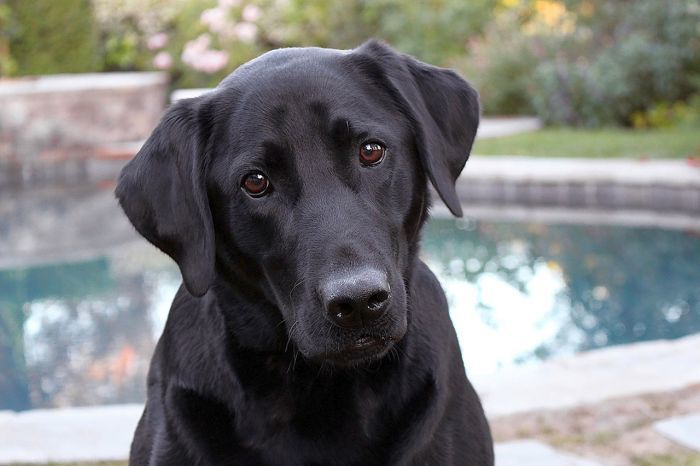
Labs are some of the best pets for any child, including those with autism spectrum disorder. Labs are extraordinarily devoted to their people and love pleasing their owner. They’re very gentle, and most are intelligent and very easy to train.
Labs do require a lot of exercise, so they’re best suited for families with large, fenced yards.
They can also experience very acute separation anxiety, so they’re better for families that spend plenty of time at home (or are willing to take Fido with them on outings), rather than those who work long hours.
Note that labs vary quite a bit in size. If you are interested in getting the biggest one possible, it is usually best to opt for a male, rather than a female.
2. Golden Retriever
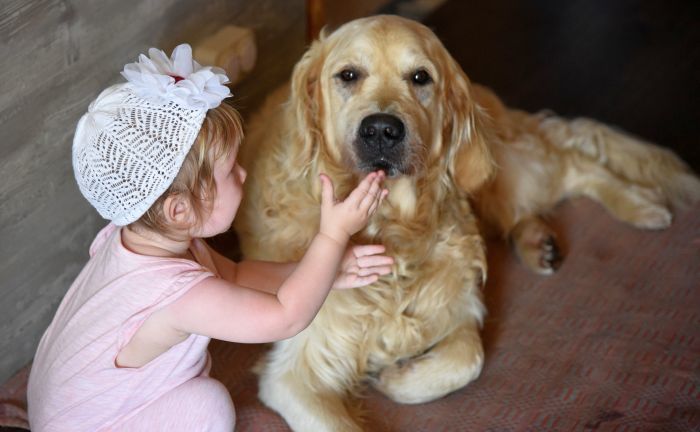
Golden retrievers are celebrated for their gentle, loving personalities and all-around awesomeness, so it shouldn’t be surprising to find that they’re great for kids with autism. They’re a popular breed for reducing anxiety and for many types of service work.
They’re usually quite similar to Labs in terms of personality and temperament, and they’re also very easy to train.
Golden retrievers do have longer hair than Labs, but this isn’t necessarily a drawback – their hugs are pretty darn cozy. It may, however, create more of a mess when they go through shed cycles. Frequent brushing may help mitigate this, and it is the kind of task many autistic children may enjoy performing.
3. Poodle
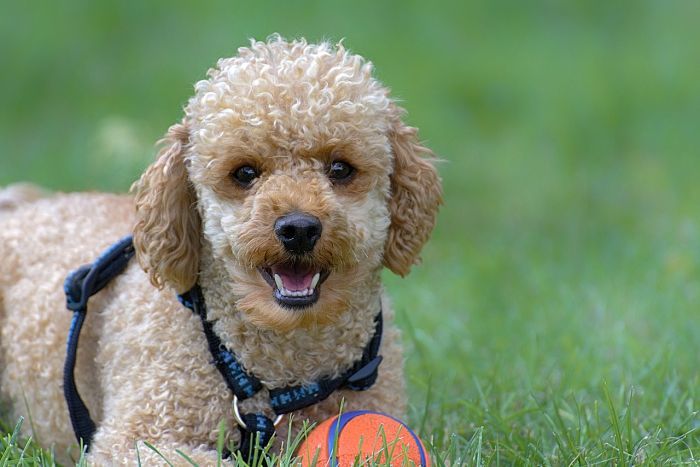
Poodles – particularly the largest variety of poodles, the standard poodle – are fantastic pets for kids. Not only are poodles often described as being “hypoallergenic,” they’re incredibly smart, easy-to-train, and loyal. They’re also surprisingly protective, and they are one of the most affectionate and kid-friendly breeds around.
Toy or miniature poodles can also make good pets for autistic children, but you’ll just need to be sure that your child understands that he or she must be gentle with their pet.
Note that poodle mixes – particularly Labradoodles and Goldendoodles – are also good choices. They combine a lot of the traits of the first three dogs on our list, including the spunk of Labs or goldens and the allergy-friendly coat of poodles.
4. Old English Sheepdog
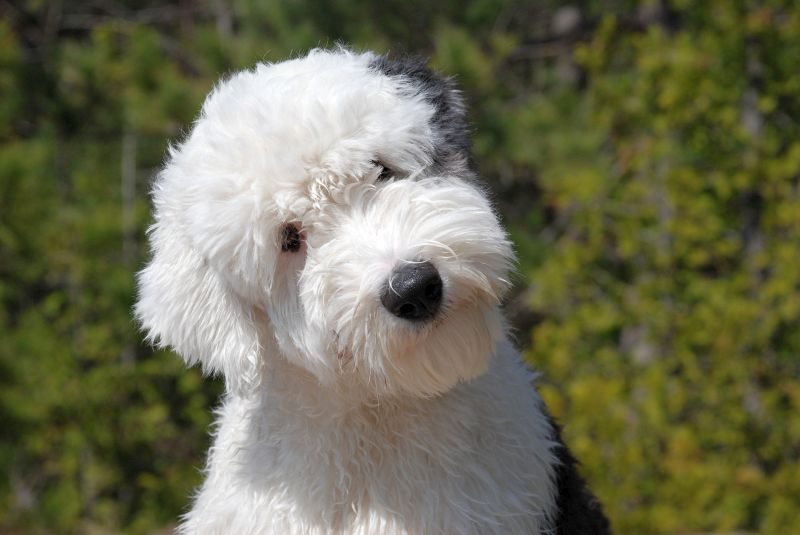
Old English sheepdogs are very family-oriented dogs who are another good option for kids with autism spectrum disorders.
They are generally pretty easy-going, and they’re always ready to play and goof around. But Old English sheepdogs also have a serious side too, and they are usually smart and easy to train. These are also protective dogs, who won’t hesitate to put themselves between danger and their family.
However, it is very important to note that Old English sheepdogs are not a good fit for all families. They drool quite a bit, and they leave a rug’s worth of hair everywhere they go. They also need very frequent brushing and regular grooming to keep their coats healthy. But if you don’t mind these challenges, these are great dogs who are very easy to love.
5. Beagle
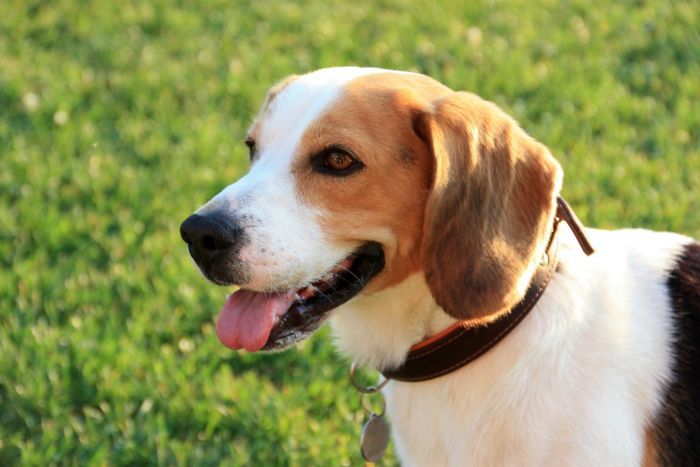
We’re including beagles on our list, but we’re doing so with a few caveats. They may not be ideal for all kids with autism spectrum disorders, but they may be exactly what some other kids and families need.
Most of the breeds we’ve included on this list are exceedingly friendly and gentle, but they’re also pretty big, which can be intimidating to some kids.
Beagles, on the other hand, rarely exceed 30 pounds, and they usually greet every person they meet with a wagging tail and smiling expression – they’re rarely intimidating to anyone.
But despite being gentle, loving, and an all-around blast to play with, beagles are pretty vocal dogs, which may irritate some kids (not to mention neighbors) with their barking (especially at night).
They’re also a bit independent at times, so training them can be challenging (they’re smart, but they just don’t care about doing your bidding – they just want to play and track interesting scents through the grass).
6. Bernese Mountain Dog
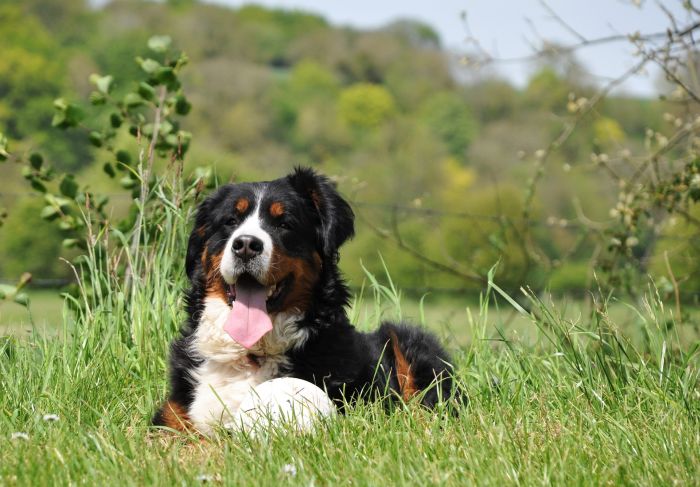
Bernese Mountain dogs are another great choice for just about any kid, but their combination of big size, gentle temperament, and intelligence makes them especially helpful for autistic youngsters.
Bernese Mountain dogs are both easy to train and eager to please. They’re also entertaining in a way that makes it hard to suppress a smile in their presence. They love pleasing their people, and they are pretty sensitive too. This means they need plenty of love and affection, which will only help forge a stronger bond between pup and kid.
Unfortunately, the breed is noted for drooling quite a bit, which some kids may find off-putting. They’re also heavy shedders, so you’ll need to be willing to deal with dog hair on the furniture. But these are both rather minor issues for such otherwise-awesome dogs. Besides, that’s why couch covers were invented!
7. Boxer
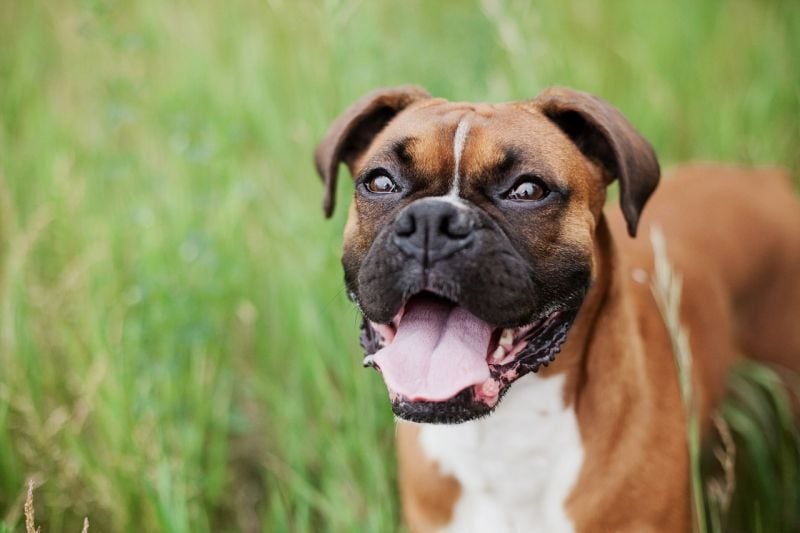
Widely regarded as one of the best breeds for kids, the boxer makes an excellent companion for most youngsters – whether or not they have autism spectrum disorder. Boxers are sweet, loving, playful, and patient, and they have an excellent temperament for autistic children.
Boxers are also a pretty good size for many families, as they’re big enough to feel like a “big dog,” yet they don’t reach the gigantic sizes that some other breeds do. Boxers are pretty friendly with most strangers they meet, so they can be great companions for families who like to take the pup on outings.
Do note that while basic obedience training is always important, but it is especially important for boxers, as many will tend to jump up on their people when excited.
8. Bull Terrier
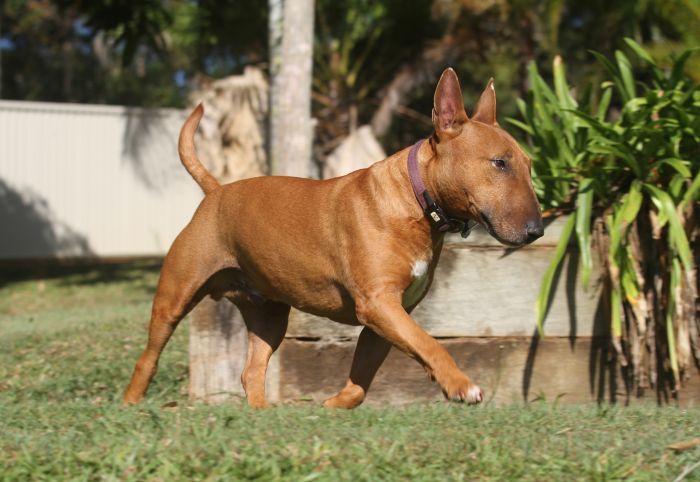
Bull terriers have a bit of a violent history (they were originally bred as fighting dogs), but modern members of the breed are among the most loving and affectionate dogs in the world – particularly with children. These are people-oriented dogs, who love hanging out with their pack, and they are pretty smart and easy to train too.
They’re also ridiculously entertaining pups, who have a talent for making their people laugh. You do need to make sure they enjoy plenty of exercise and stimulation though, as they can become quite destructive if bored.
Ironically, the bull terrier is one of the dog breeds that is most commonly suspected of displaying canine autism. There is a ton of debate about the issue (some authorities don’t even believe such a condition exists); we’ve written about the question of canine autism before, so go check it out and see what you think.
Check out these great bull terrier mixes — they’re too cute for words!
9. Great Dane
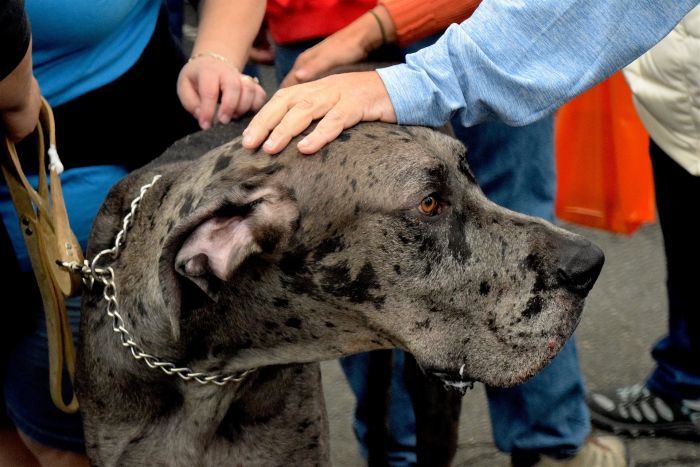
Many autistic children enjoy big dogs, particularly big dogs who like to snuggle. This makes the Great Dane – who satisfies both of these criteria – a great choice.
Yes, they’re gigantic dogs, so you’ll need to have the space (and food budget) to accommodate them, but they’re also smart, loving, and exceptionally loyal.
The size of a Great Dane actually provides a number of benefits – particularly when combined with their protective and nurturing nature. Ultimately, the value these dogs can provide an autistic child is hard to exaggerate. Were I in need of a pet for an autistic child, a Great Dane would likely be one of my first choices.
10. Newfoundland
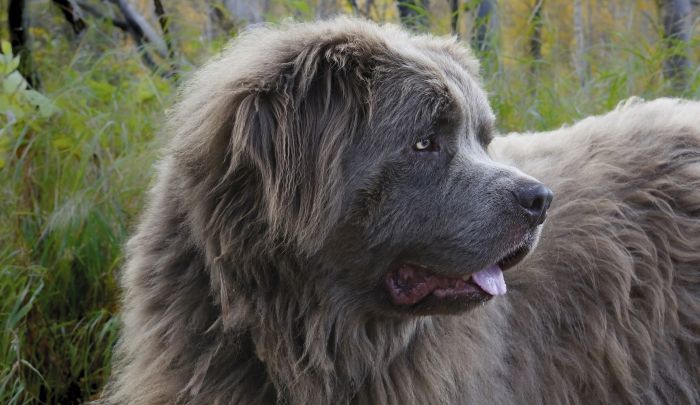
If a gigantic and gentle floof sounds like the perfect canine companion for your kid, you must consider the Newfoundland.
They’re essentially super-sized, super-fluffy, super-sweet Labs, and they’re easily one of the best dogs for kids – especially autistic children – in the world.
Just beware: I’m not kidding when I say these are gigantic dogs. Many exceed 100 pounds, and they occasionally reach 150 pounds or so — and their long coats make them look even bigger than this. But again, big is often best when picking out a pup for your autistic child.
Like many other big, fluffy dog breeds, they drool and shed a bunch. But that won’t matter once you see your child bond with his or her new Newfie (as they’re often called).
If I seem like I’m selling Newfies pretty hard, it’s because I am. I think they’re just awesome, and they deserve very serious consideration for parents of autistic kids.
11. Rottweiler
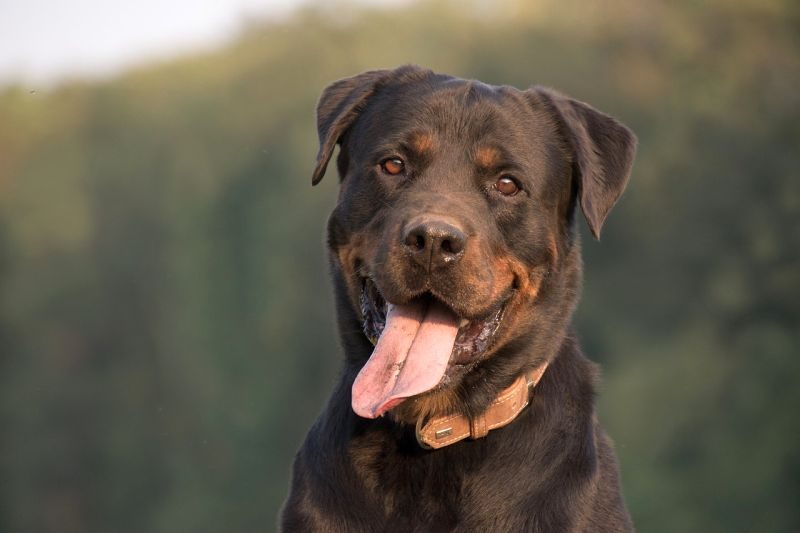
As with beagles, I’m including Rottweilers because they may make an unbelievably good choice for some autistic children, even though they’re clearly not cut out for all families.
Rotties – even relatively small ones who may only weigh 80 pounds or so — are a whole lotta dog. They’re very strong and built like linebackers. They’re also assertive and more than willing to test their owner’s boundaries. They are in no way, shape, or form a good choice for first-time dog owners.
But those willing to take charge, train their pooch, and provide plenty of opportunities for exercise will be rewarded with a level of love and devotion that’s difficult to convey. Rotties are also very intelligent and easy to train – they’ll do just about anything to get some love and affection from their people.
Also, Rotties are very snuggly dogs who love physical contact. This may provide special value for some autistic children.
12. Pit Bull
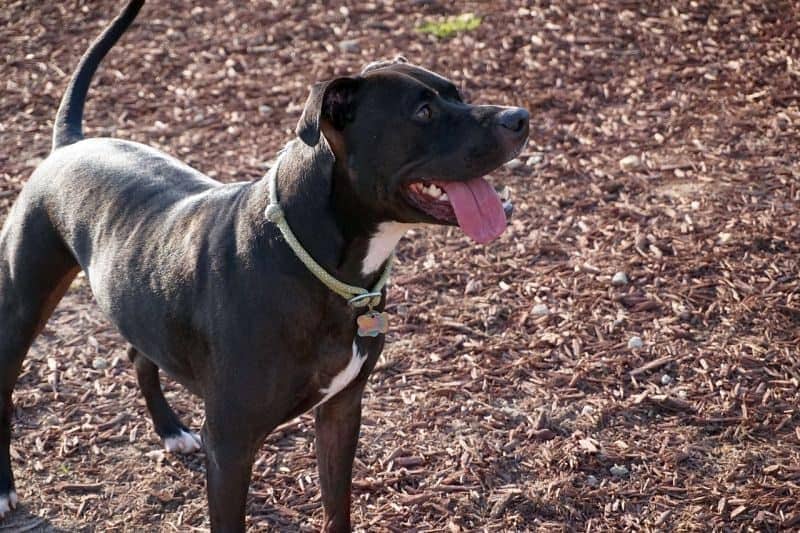
There’s a lot of hysteria about this breed, but the truth is, pits can make awesome pets for kids – including those on the autism spectrum.
Listing the good traits of pit bulls would take days. They’re one of the friendliest breeds in the world (in fact, they’re widely considered too pleasant and outgoing for guard dog work), and they have million-watt hearts that never stop beaming out love to their peeps. They’re quite smart, they’re easy to train, and they’re absolutely adorable too.
Now let’s be clear: I’m not suggesting that you pick up a mature pit-mix with a murky history and tell your kid to have at it.
But I am suggesting that you consider obtaining a beautiful little pit pup from a reputable breeder, and – like you would with any other dog – train and socialize it properly. If you do, you’ll likely be glad you did – these are awesome dogs.
Dogs have been shown to provide significant value to a number of children diagnosed with autism spectrum disorders, and, as mentioned earlier, the benefits probably go both ways. Just be sure to think carefully about whether your child would benefit most from a service dog, a therapy dog, or a companion.
Once you figure out the answer to this question, just follow the recommendations listed above, and if you decide a pet is the best choice for your child, consider one of the breeds listed above.
Remember that no matter what kind of dog you select, it is important to keep safety in mind when kids and dogs are concerned. Never allow children to interact with dogs unattended and always be sure to teach your kids how to safely interact with dogs.
Do you have an autistic child? Why are you considering a dog for them? Does your kid already have a canine companion – how is it working out? Share your stories in the comments!
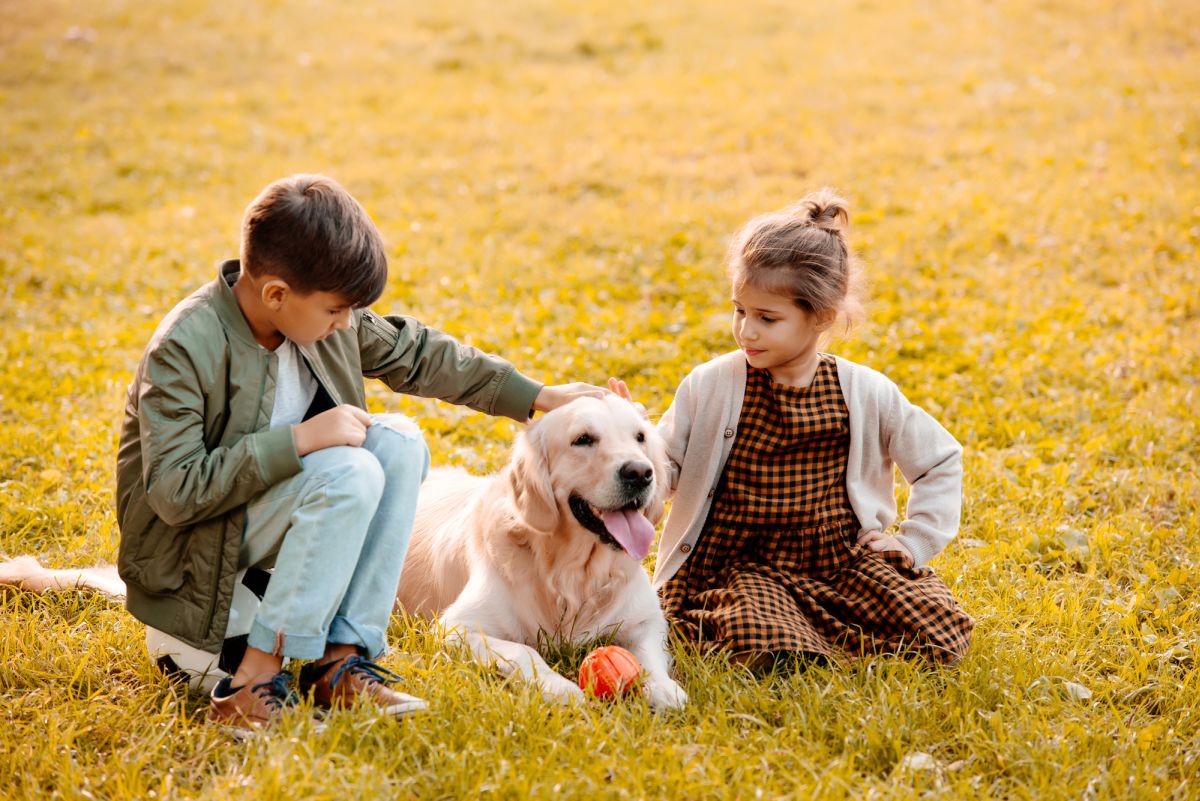




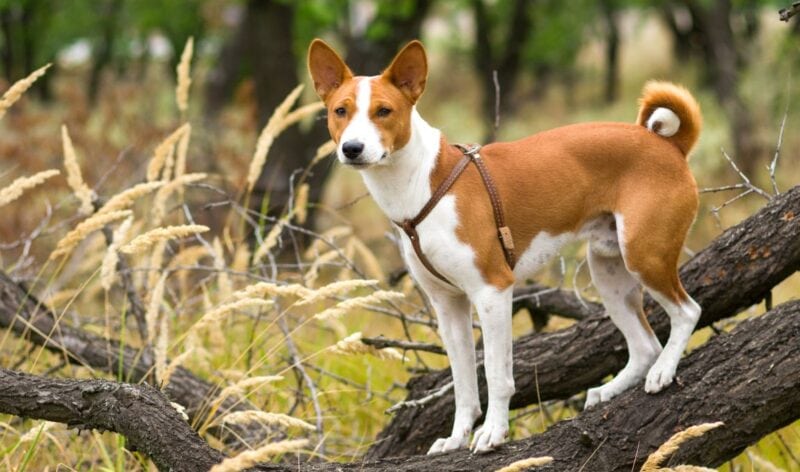
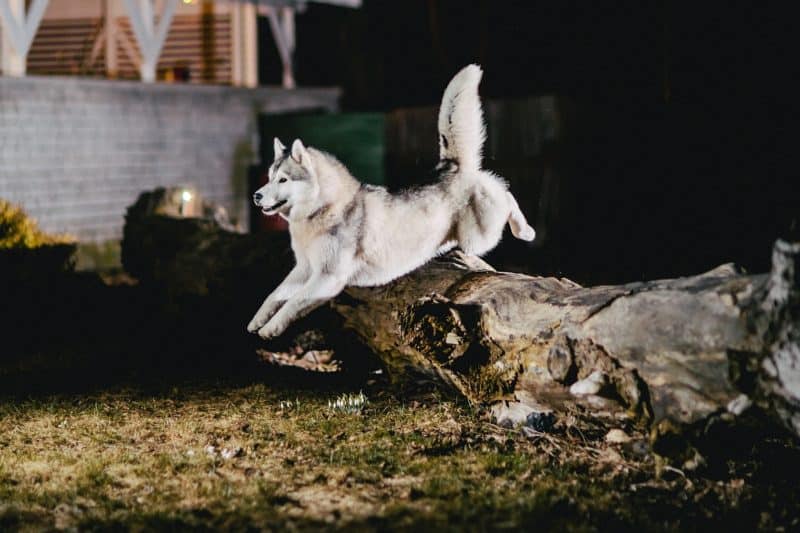

Leave a Comment